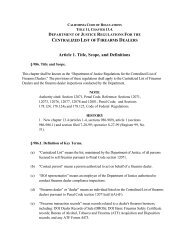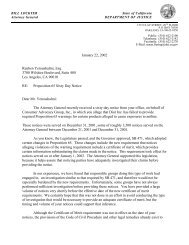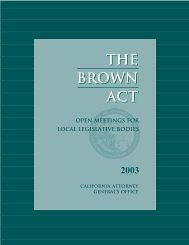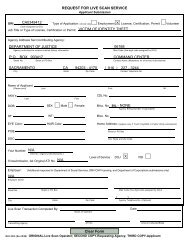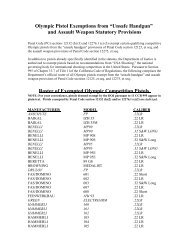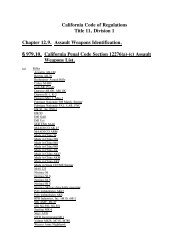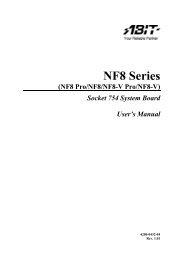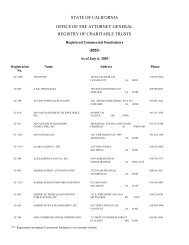Legal Rights of Persons With Disabilities - Ossh.com
Legal Rights of Persons With Disabilities - Ossh.com
Legal Rights of Persons With Disabilities - Ossh.com
Create successful ePaper yourself
Turn your PDF publications into a flip-book with our unique Google optimized e-Paper software.
disability, or veteran's allowances to which they may be entitled before be<strong>com</strong>ing eligible for SSI. There is<br />
no waiting period for SSI benefits. (20 C.F.R. ' 416.210.)<br />
3. Application Procedures<br />
To apply for social security disability or SSI benefits, an individual or his or her representative<br />
must file an application with the local SSA <strong>of</strong>fice. An individual must furnish medical and other evidence<br />
<strong>of</strong> disability as part <strong>of</strong> the application process. (20 C.F.R. '' 416.301 et seq., 416.202 et seq. and 416.601<br />
et seq.)<br />
4. Determining Disability<br />
To receive either disability or SSI benefits, an individual must show that he or she is unable to<br />
work because <strong>of</strong> blindness or disability. "Blindness" is defined as visual acuity <strong>of</strong> 20/200 or less in the<br />
better eye with use <strong>of</strong> a correcting lens. "Disability" is defined in terms <strong>of</strong> an inability to engage in any<br />
"substantial gainful activity." "Substantial gainful activity" means significant and productive physical or<br />
mental duties done or intended to be done for pay. Household tasks, hobbies, therapy, school attendance,<br />
and social activities are not generally considered substantial gainful activity. A person may still have some<br />
earnings (generally under $300 a month) and not be considered engaged in substantial gainful activity. If<br />
an individual's disability is merely temporary and is not expected to last 12 months, he or she cannot<br />
receive social security disability or SSI benefits. (20 C.F.R. '' 404.1501 et seq. and 416.971 et seq.)<br />
Certain disabilities are considered severe enough to qualify a person for social security disability or<br />
SSI benefits automatically. Among these are kidney failure requiring dialysis, an IQ score <strong>of</strong> 59 or below,<br />
diabetes mellitus with nerve damage, mental diseases resulting in impairment <strong>of</strong> intellectual functioning<br />
and restriction <strong>of</strong> daily activities, and some types <strong>of</strong> cancer. (20 C.F.R.<br />
' 404.1520 et seq.)<br />
Individuals will not be considered disabled merely because they are no longer able to perform their<br />
previous job. A person must be unable to do any other type <strong>of</strong> work, taking into consideration age,<br />
education, and work experience. The SSA uses standardized medical-vocational guidelines to determine<br />
what work the applicant should be able to perform if an individual's disability is "exertional" -- for example,<br />
affecting the ability to walk, stand, or lift. For "nonexertional" disabilities -- for example, difficulty with<br />
<strong>com</strong>munication, understanding, or handling stress -- the determination is not standardized. The SSA does<br />
not consider whether the work which an individual could perform exists in the immediate area in which the<br />
individual lives, whether a specific job vacancy exists for the person, or whether the individual would be<br />
hired if he or she applied for work. (20 C.F.R.<br />
' 404.1520.)<br />
5. Referral to Rehabilitation Services<br />
Individuals receiving social security disability benefits and SSI may be referred to the state agency<br />
providing rehabilitation services. In California, the designated state agency is the Department <strong>of</strong><br />
Rehabilitation. If a person refuses without "good cause" to accept rehabilitation services, eligibility for SSI<br />
or the amount received for social security disability will be affected. (20 C.F.R. ' 416.213.)<br />
6. The Appeal Process<br />
If you are denied disability or SSI benefits you may appeal. To initiate the appeal process, you<br />
must file a "request for reconsideration" with the Social Security Administration within 60 days <strong>of</strong><br />
59



